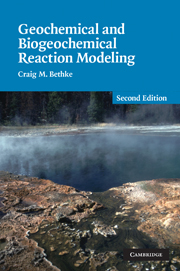Book contents
- Frontmatter
- Contents
- Preface
- Preface to first edition
- A note about software
- 1 Introduction
- 2 Modeling overview
- Part I Equilibrium in natural waters
- Part II Reaction processes
- Part III Applied reaction modeling
- Appendix 1 Sources of modeling software
- Appendix 2 Evaluating the HMW activity model
- Appendix 3 Minerals in the LLNL database
- Appendix 4 Nonlinear rate laws
- References
- Index
Preface to first edition
Published online by Cambridge University Press: 05 August 2012
- Frontmatter
- Contents
- Preface
- Preface to first edition
- A note about software
- 1 Introduction
- 2 Modeling overview
- Part I Equilibrium in natural waters
- Part II Reaction processes
- Part III Applied reaction modeling
- Appendix 1 Sources of modeling software
- Appendix 2 Evaluating the HMW activity model
- Appendix 3 Minerals in the LLNL database
- Appendix 4 Nonlinear rate laws
- References
- Index
Summary
Geochemists have long recognized the need for computational models to trace the progress of reaction processes, both natural and artificial. Given a process involving many individual reactions (possibly thousands), some of which yield products that provide reactants for others, how can we know which reactions are important, how far each will progress, what overall reaction path will be followed, and what the path's endpoint will be?
These questions can be answered reliably by hand calculation only in simple cases. Geochemists are increasingly likely to turn to quantitative modeling techniques to make their evaluations, confirm their intuitions, and spark their imaginations.
Computers were first used to solve geochemical models in the 1960s, but the new modeling techniques disseminated rather slowly through the practice of geochemistry. Even today, many geochemists consider modeling to be a “black art,” perhaps practiced by digital priests muttering mantras like “Newton–Raphson” and “Runge–Kutta” as they sit before their cathode ray altars. Others show little fear in constructing models but present results in a way that adds little understanding of the problem considered. Someone once told me, “Well, that's what came out of the computer!”
A large body of existing literature describes either the formalism of numerical methods in geochemical modeling or individual modeling applications. Few references, however, provide a perspective of the modeling specialty, and some that do are so terse and technical as to discourage the average geochemist. Hence, there are few resources to which someone wishing to construct a model without investing a career can turn.
- Type
- Chapter
- Information
- Geochemical and Biogeochemical Reaction Modeling , pp. xv - xviiiPublisher: Cambridge University PressPrint publication year: 2007

